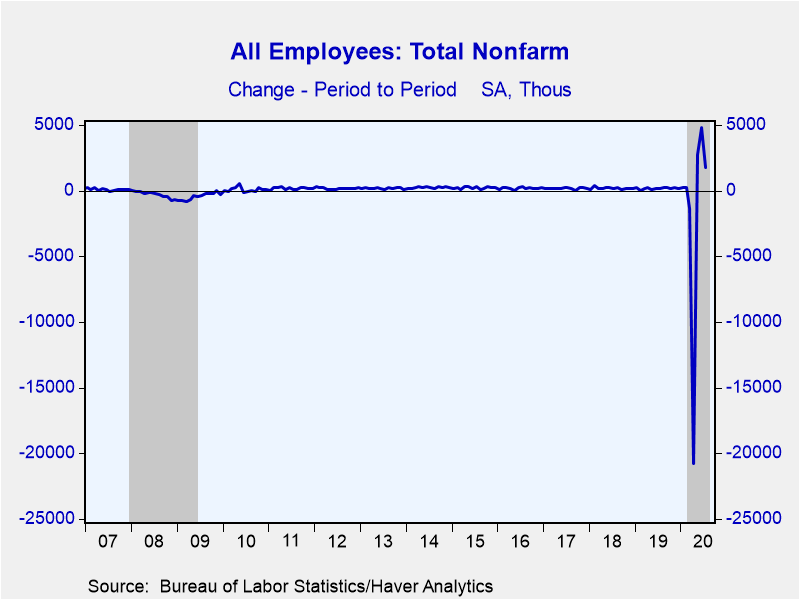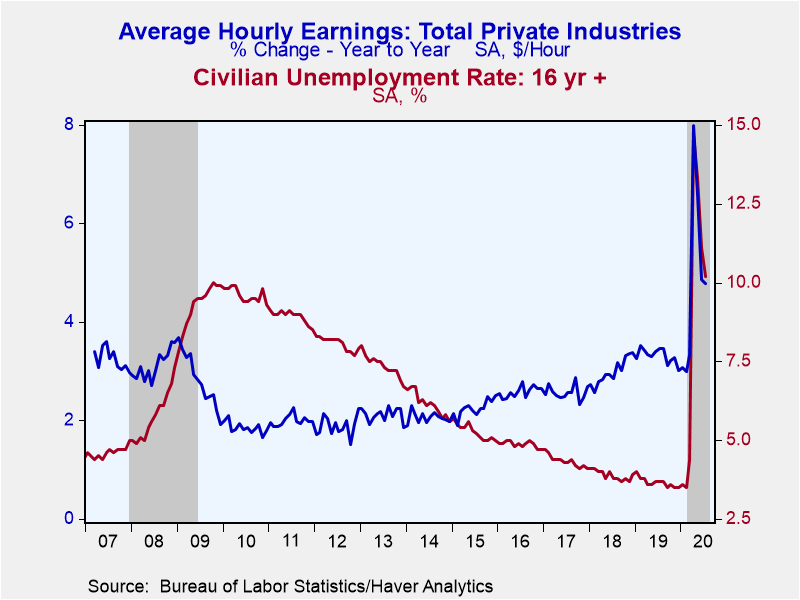 Global| Aug 07 2020
Global| Aug 07 2020U.S. Employment Growth Moderates in July; Earnings Rise Modestly & Jobless Rate Declines
by:Tom Moeller
|in:Economy in Brief
Summary
• Rise in jobs slows after recovering from coronavirus outbreak. • Earnings improve modestly. • Unemployment rate declines to four-month low. The labor market continues to improve. Nonfarm payroll employment increased 1.763 million in [...]
• Rise in jobs slows after recovering from coronavirus outbreak.
• Earnings improve modestly.
• Unemployment rate declines to four-month low.
The labor market continues to improve. Nonfarm payroll employment increased 1.763 million in July (-7.5% y/y) after rising 4.791 million in June, revised from 4.800 million. May employment improved 2.725 million, revised from 2.699. These gains followed sharp declines in the prior two months of economic recession. A 1.898 million increase had been expected in the Action Economics Forecast Survey. The estimates amongst 26 forecasters ranged from 500 to 3,300.
Average hourly earnings improved a modest 0.2% (4.8% y/y) but factory pay strengthened 0.6%. A 0.5% decline had been expected.
The unemployment rate fell to 10.2% from 11.1%. A decline to 10.5% had been expected. Employment in the household survey increased 1.350 million after rising 4.940 million in June while the labor force fell 62,000 after increasing 1.705 million. The overall jobless rate, including those who were marginally attached or working part-time for economic reasons, declined to 16.5% from 18.0%.
The employment & earnings data are collected from surveys taken each month during the week containing the 12th of the month.
The labor market data are contained in Haver's USECON database. Detailed figures are in the EMPL and LABOR databases. The expectations figures are in the AS1REPNA database.
Which Workers Have Been Most Affected by the COVID-19 Pandemic? from the Federal Reserve Bank of St. Louis can be found here https://www.stlouisfed.org/on-the-economy/2020/july/workers-affected-covid19-pandemic
| Employment: (SA, M/M Change, 000s) | Jul | Jun | May | Jul Y/Y | 2019 | 2018 | 2017 |
|---|---|---|---|---|---|---|---|
| Payroll Employment | 1,763 | 4,791 | 2,725 | -7.5% | 1.4% | 1.6% | 1.6% |
| Previous Estimate | -- | 4,800 | 2,699 | -- | -- | -- | -- |
| Manufacturing | 26 | 357 | 240 | -5.7 | 1.2 | 2.0 | 0.7 |
| Construction | 20 | 163 | 456 | -4.1 | 2.8 | 4.6 | 3.6 |
| Private Service-Producing | 1,423 | 4,222 | 2,560 | -8.6 | 1.5 | 1.5 | 1.8 |
| Government | 301 | 54 | -511 | -4.3 | 0.6 | 0.5 | 0.4 |
| Average Weekly Hours - Private Sector | 34.5 | 34.6 | 34.7 | 34.3 | 34.4 | 34.5 | 34.4 |
| Private Sector Average Hourly Earnings (%) | 0.2 | -1.3 | -1.1 | 4.8 | 3.3 | 3.0 | 2.6 |
| Unemployment Rate (%) | 10.2 | 11.1 | 13.3 | 3.7 | 3.7 | 3.9 | 4.3 |
Tom Moeller
AuthorMore in Author Profile »Prior to joining Haver Analytics in 2000, Mr. Moeller worked as the Economist at Chancellor Capital Management from 1985 to 1999. There, he developed comprehensive economic forecasts and interpreted economic data for equity and fixed income portfolio managers. Also at Chancellor, Mr. Moeller worked as an equity analyst and was responsible for researching and rating companies in the economically sensitive automobile and housing industries for investment in Chancellor’s equity portfolio. Prior to joining Chancellor, Mr. Moeller was an Economist at Citibank from 1979 to 1984. He also analyzed pricing behavior in the metals industry for the Council on Wage and Price Stability in Washington, D.C. In 1999, Mr. Moeller received the award for most accurate forecast from the Forecasters' Club of New York. From 1990 to 1992 he was President of the New York Association for Business Economists. Mr. Moeller earned an M.B.A. in Finance from Fordham University, where he graduated in 1987. He holds a Bachelor of Arts in Economics from George Washington University.
More Economy in Brief
 Global| Feb 05 2026
Global| Feb 05 2026Charts of the Week: Balanced Policy, Resilient Data and AI Narratives
by:Andrew Cates








